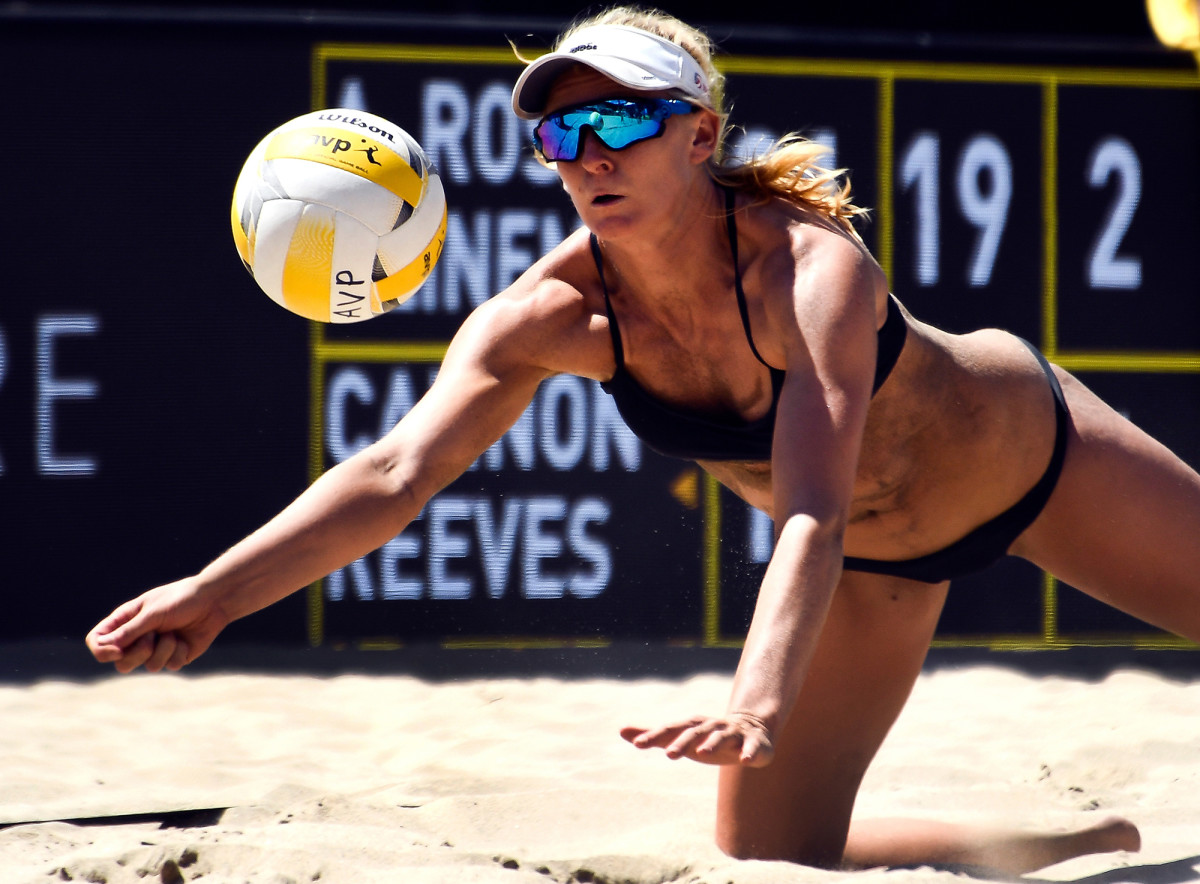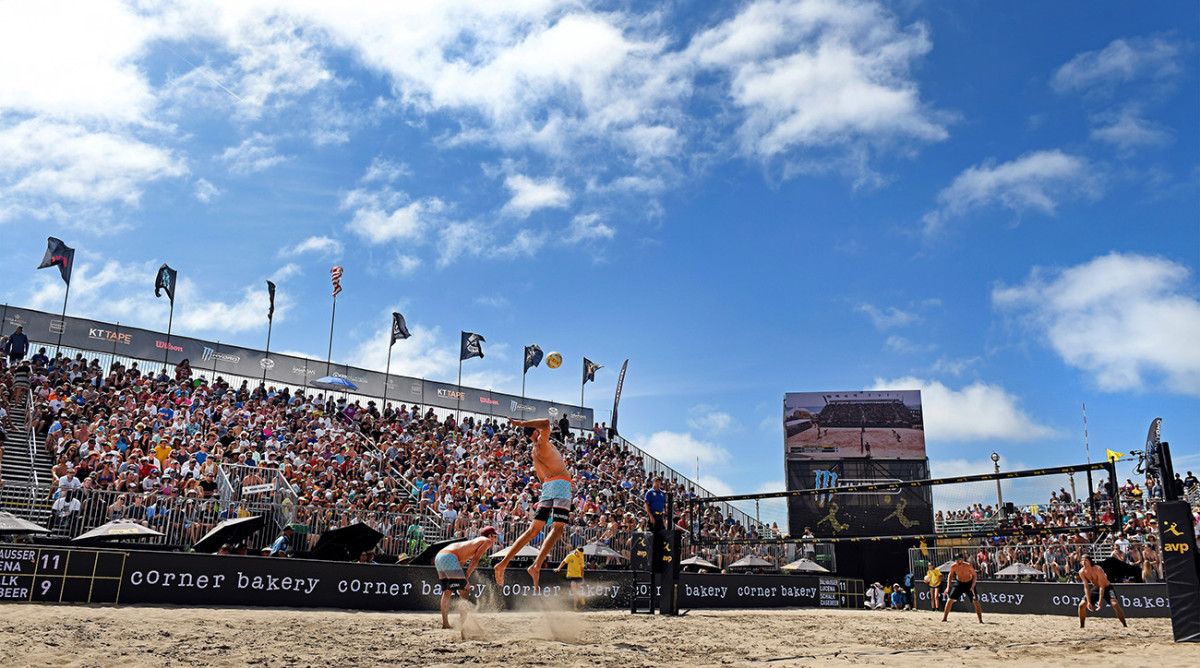Coronavirus and the U.S. Olympic Qualifying Conundrum
Five women got on the phone last Friday to weigh a heavy decision.
Each represented half of the five American beach volleyball tandems vying to represent the U.S. at the 2020 Olympics in Tokyo. They had (virtually) gathered to discuss whether to fly to Australia for an upcoming tournament and continue competing against each other for the remaining spot on Team USA—and risk exposure to coronavirus or a travel ban that would keep them overseas—or to stay home and risk watching the other women on the call celebrate on the medal stand in Tokyo.
“Everyone on the call,” Kerri Walsh-Jennings recalled on Monday as she and her husband made dinner for their children, “even though we were in different places in the qualification process, was in the same boat. Everyone has been training for months.” Walsh-Jennings’ Olympic commitment had spanned two decades, and garnered four medals, three of them gold. No one on the call had earned enough points to secure their trip to the 2020 Games, though, so “everyone wanted to go [to Australia], because everyone stood to gain by playing another tournament.”
Olympic rules dictate that each country can send a maximum of two women’s teams and two men’s teams to compete in the Games in beach volleyball, regardless of world ranking. This competition for these spots is particularly fierce in the U.S., which has won most of the medals awarded in the sport since its Olympic debut in 1996.
Emily Day, who grew up watching Walsh-Jennings’ era of dominance, had hoped to use the FIVB Gold Coast tournament, scheduled to be played this week in Australia, to narrow the gap between her team and the duo of Walsh-Jennings and Brooke Sweat. “Even though we’re all part of Team USA, we’re competing against one another,” Day said. “When one of our teams decides not to go to a tournament, the others are like, ‘Heck yes, this is a great opportunity to pass the team that’s not going.’
“I am so proud of us women who came together over the phone and shared information and told the truth and shared what we were feeling,” Day continued. “That wasn’t easy to do.”
The top American pair, April Ross and Alix Klineman, ranked second in the world, had already secured their spot in Tokyo. The five teams gunning for the last spot, according to Day, “ordinarily don’t want to share who’s going and who’s not going [to a tournament].” As the coronavirus pandemic threw the world into flux, Day and her partner Betsy Flint “were thinking, Are we crazy for not going? Is everybody else going? To get on the phone and hear that [the other players] were scared of getting quarantined or not being able to come back and see their families, it validated what we were feeling.”
Some were mothers. One of them, unmarried and without kids, told the group that her Olympic dream was worth flying to Australia for, even if she learned upon landing that she’d have to stay there indefinitely. Their dilemma was a scaled-down version of the one world leaders were facing: be cautious and shut everything down, upending your nation’s economy in the process, or listen to your competitive heart, your belief in yourself and your team, and put lives at risk.

The moment captured the larger Tokyo qualification picture, in microcosm. Across the globe, only 43% of the athlete spots in the 2020 Games have been filled. Most countries’ qualification events have been called off, at least temporarily.
Given the rising number of COVID-19 cases and the strains on the world’s medical and economic systems, Olympic dreams can seem irrelevant—that is, unless you have invested years of strain and sacrifice to reach the brink of representing your country on the brightest athletic stage on earth.
Some sports, like the marathon, have already decided which Americans have qualified for the Games. Meanwhile, the U.S. athletes who train at the mammoth complex in Colorado Springs were told by email on Tuesday night that the facilities would close on Wednesday. USA Gymnastics has cancelled all meets through at least May 10. The U23 men’s soccer team was in Mexico last Friday, preparing for regional qualifying, when they learned that their upcoming matches had been suspended. They came home to the U.S. that night.
The two largest USOC events—the track and field trials, and the swimming trials, both scheduled for June—are still on the calendar. But given the number of athletes and officials necessary to run a single preliminary heat, both trials would violate the federal mandate against gathering in groups of more than 10 people.
The IOC, for its part, announced this week that any changes to its qualification process “will be published by the beginning of April 2020.”
That news was still days away when the American beach volleyball women were debating whether to fly to Australia’s Gold Coast (where, incidentally, Tom Hanks and his wife Rita Wilson had just tested positive for COVID-19).
“I was like, We’re going, I have my wipes, I have my hand sanitizer,” Day recalls. “Then Wednesday night things started escalating…NBA, MLB…I woke up and now the NCAA canceled [March Madness]. I was like, Oh man, they’re gonna cancel this event.
“I wake up on Friday, no cancellation. I hear about the Formula One event in Melbourne being called off. I’m like, They’ve gotta cancel our thing, right?”
Day and Flint had their flight Down Under booked for Friday night. They decided not to board it. To wait a little longer. Within 12 hours, the tournament was called off.
By that time, Walsh-Jennings—the most decorated and arguably the most respected player in the sport’s history—had contacted a USA Volleyball official “to tell him it’s unfair for athletes to weigh their well-being versus going to a tournament that can help them get to the Olympics.”

On the men’s side, Nick Lucena and his partner, 6’9” legend Phil Dalhausser, were following a plan based on their experience in 2016, when they earned their spot in the Rio Games by grinding through 15 events in ten months. When the ’16 Olympics rolled around, the pair felt “burnt out” and got ousted in the quarterfinals.
This time, Lucena and Dalhausser waited until March to make their qualifying run. The coronavirus intervened. Lucena-Dalhausser had a strong showing last week at a men’s tournament in Doha, Qatar, but they still trailed two other American teams in points. When the Doha event wrapped up, they kept one eye on the latest virus news and the other eye on the clock as they prepared to fly from the Persian Gulf to Australia’s Gold Coast, for the next stop on the FIVB tour.
Lucena expected to get an email at any moment canceling the Gold Coast event. “We didn’t know if we should buy a ticket home, or head to Australia,” he said. Lucena and Dalhausser sat with their bags at Hamad International Airport, two hours before their 14-hour flight to Australia was scheduled to take off. Their friends, and fellow U.S. point-chasers, Chaim Schalk and Chase Budinger (the former NBA first-round pick), had just taken off, bound for Oz. Finally, Lucena finally got word that the Gold Coast tourney was off. Three hours after that, he was on a flight home to Florida. (Dalhausser was unable to adjust his travel as quickly, so he stayed in Qatar another night.)
“You can’t plan for something like this,” says Lucena. “I’m not frustrated, I’m more interested to see what happens next, like [whether] the Olympics will even happen. It’s crazy. I never thought they’d cancel March Madness.”
More tumult awaited Lucena at home. His wife, Brooke Niles, head coach of Florida State’s beach volleyball team, had just learned that her season was over, two weeks in. She was preparing to tell her seniors that their careers were finished. The full impact of his situation didn’t strike Lucena until Monday. He usually trains on campus, but when he learned FSU was locked down, he worked out at his home gym, “until I was like, ‘Damn, dude, what am I lifting for?’”
The FIVB beach schedule now looks like a departures billboard in an airport (CANCUN, POSTPONED … SINGAPORE, CANCELLED … YANGZHOU CHINA, POSTPONED … SIMING CHINA, CANCELED) so every beach player, like other aspiring Olympians across the globe, is rethinking, well, everything. Starting with where to train.
The USA Beach Volleyball facility, in Day’s hometown of Torrance, Calif., is closed. Commercial fitness centers in southern California are, too. On Monday morning, the staff at the Mamba Sports Academy, still reeling from the death of Kobe Bryant seven weeks earlier, was training a handful of athletes at their Redondo Beach facility, but the doors of The Yard Training Center in Hermosa Beach—home to countless Olympic athletes (and NFL and NBA players) over the years—were locked in accordance with an order from L.A. mayor Eric Garcetti. On Thursday, Budinger told SI he is currently in a 14-day quarantine at his home in L.A..
Across the street from The Yard, Pacific waves crashed onto the sand where Walsh-Jennings and Day usually practice. Those beach courts were empty now, save for a pickup game and a smattering of parents seizing a break in the rain to get their homebound kids outside for some fresh air.
Day, who still clings to the hope that she and her partner can leapfrog four women’s teams and compete in Tokyo for sport’s highest prize, said, “My dad, who doesn’t ever tell me what to do, told me, Don’t go to Australia. I ask his opinion all the time [and he never gives it]. But with this he outright said, Emily, don’t go. That weighed heavily on me.”
In these times, which stand so glaringly without precedent, we are reminded of such connections, of the preciousness of family, of the importance of personal contact (social distancing notwithstanding).
“The kids on our street all play together,” Lucena says of his home in the Florida capital. When he returned from Qatar, Lucena sent out an email to the neighborhood parents to tell them he had been traveling internationally. “I won’t take it personally if you keep your distance from me or our kids,” he wrote. “My son doesn’t understand. He asked, ‘Why can’t I play with our neighbor?’”
Among the most important reminders during this crisis pertains to the value of reason. The priceless gift of talking and listening.
Despite the high takes and frayed nerves, “no one on the call [on Friday] pointed fingers and no one yelled at each other,” said Walsh-Jennings. “One team agreed to disagree, and the other teams were OK with that.
“The people who disagreed were very honest, and we all appreciated that, because that’s a hard thing to do. This was bigger than volleyball.”
As for the lingering question of whether there be an Olympics at all, Walsh-Jennings offers: “My dad mentioned that three weeks ago and I laughed at him. I said, You’re crazy, Dad. Now, obviously, it seems more realistic. I feel like, worst case, they’ll push it back a month or two. I know in Japan they are doing everything they can—the whole world is doing what it can.
“Part of being an athlete [is], you take the things you can’t control and put them to good use. I’m expecting the Olympics to happen. I’m expecting to be there with Brooke. It’s heart wrenching, what the world is going through, but I have already seen so much beauty come from it.”
